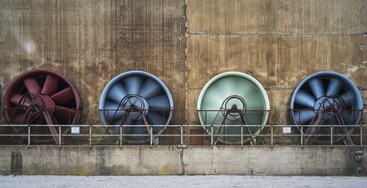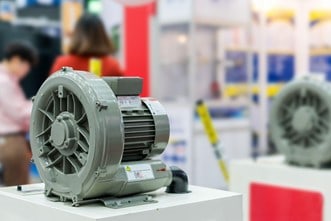[ad_1]
Featured image by Crystal Kwok on Unsplash
An industrial blower is a type of mechanical fan used to move gases and particles from one location to another. This equipment uses pressure differentials created by the rotating blades. This causes the gas particles to flow at high speeds.
In choosing the best industrial blower for your particular needs, you need to have a clear understanding of the types of industrial blowers available. It’s also essential to understand that each type has its own set of applications, ratings, and limitations. It is therefore necessary that you first list down the tasks that need to be done. Doing this will make it easier for you to identify the type of industrial blower that best suits your needs.
What Industries Use Industrial Blowers?
A wide range of industries use industrial blowers. They include the following:
Food and Beverage Processing Plants
Here, blowers are used to remove humidity during processing. They also dry packaged foods quickly at the end of the line.
Wastewater Treatment Plants
In wastewater treatment plants, industrial blowers move sludge and scum from one location to another.
Pulp and Paper Mills
In these industries, industrial blowers keep the machines running smoothly by moving air through the system.
Textile Mills
In textile mills, industrial blowers remove excess moisture from the air. They also remove dust and lint from the fabrics.
Paint Booths
In paint booths, industrial blowers exhaust fumes and vapors out of the booth.
Metalworking Industries
In these industries, industrial blowers clean metal parts by blowing off any contaminants that may be present.
Industrial Blowers in the Automotive Industry
In the automotive industry, industrial blowers dry wet air filters after they’re cleaned. They are also used to dry out mufflers before they are placed back on the cars after repairs or during installation.
Other applications include storage tanks where fans remove moisture to increase capacity and reduce corrosion. Additionally, some industries use them on heating devices that use gas combustion to produce heat in furnaces, kilns, and boilers.
To help you choose the right industrial blower for your particular needs, here are some tips you may want to follow.
1. Understand the Classifications of Industrial Air Blowers
In general, industrial blowers are either centrifugal or axial.
Centrifugal Industrial Blower
A centrifugal blower relies on radial impellers to draw air into the center of the unit. Then it discharges it at high speeds through a set of stationary vanes. The amount of airflow determines the speed of rotation. Centrifugal blowers are generally used with high-pressure applications where large volumes of air or gas are required.
Axial Industrial Blower
An axial blower relies on a set of blades that run parallel to the shaft. Lower pressure applications use these blowers, as they can move more air than a centrifugal blower of the same size. However, they do not create as much positive pressure.
2. Know the Different Applications of an Industrial Blower
Filtration
Air filtration is the process of removing impurities from the air. Industrial blowers create a negative pressure within the filter housing, drawing the particles into the filter media, trapping them there.
Dust Collection
Dust collection is the process of removing dust and other small particles from the air. In these applications, industrial blowers create a positive pressure within the dust collector. This draws the particles into the collection media and traps them there.
Fume Extraction
Fume extraction is the process of removing fumes and gases from a work area. Industrial blowers create a negative pressure within the fume hood, drawing the fumes and gases into the hood and capturing them there.
Pneumatic Conveying
Pneumatic conveying is the transporting of materials through the air. In these applications, industrial blowers create a positive pressure within the conveying ductwork. This draws the particles into the conveying line and transport them away. You can see an example of a positive displacement blower at: https://www.nwflowtech.com/products/positive-displacement-blowers/.
Cooling Air for Hot Parts
In these applications, industrial blowers provide pressurized cooling air for hot parts. Usually, the coolant-to-air heat exchanger in these blowers induces the pressurized cooling airflow.
Air Saturation
Air saturation is the process of introducing a gas into the air. Industrial blowers in this application pump pure oxygen or other gases into various workstations or furnaces.

Exhausting Air
Industrial blowers are often used in this application to exhaust air from a work area. The exhaust hood or stack often induces pressurized airflow.
Blow-Off
In this application, industrial blowers vent a high-pressure area to the atmosphere. The pressure relief valve or a clamping ring of a pressurized vessel induces the necessary airflow.
3. Familiarize Yourself with Industrial Blower Ratings
It’s vital to understand how the ratings of these fans before choosing the best industrial blower for your particular needs. There are three standard ratings for industrial blowers.
Dynamic Pressure
This first rating specifies the pressure at which a fan will deliver its rated air volume. It’s typically expressed as “inches of water” or “millimeters of water.” The higher the number, the greater the amount of airflow an industrial blower produces. So, as an example, a fan with a dynamic pressure rating of 50 inches of water will deliver more airflow than a fan with a rating of 25 inches of water.
Static Pressure
This second rating specifies the amount of pressure that a fan can withstand without sustaining damage. It’s also expressed as “inches of water” or “millimeters of water.” The higher the number, the greater the static pressure that a fan can withstand. So, for example, a fan with a rating of 25 inches of water will be able to handle more static pressure than a fan with a rating of 15 inches of water.
Air Volume
This final rating specifies how much air an industrial blower can move. Air volume rating is measured in cubic feet per minute (CFM). The higher the CFM rating, the greater airflow an industrial blower will deliver at its rated pressure. So, for example, a fan with a CFM rating of 500 will deliver more air than a fan with a rating of 300 CFM.
RELATED ARTICLE: WHAT WILL YOUR BUSINESS LOOK LIKE OVER THE NEXT 50 YEARS?
4. Know What Features to Look For in an Industrial Blower
You should also consider the different features of an industrial blower, as these may affect your work operations.
Horsepower
The higher the horsepower of a blower, the more airflow or air volume it can produce. In this context, you can just use the term “volume,” as there’s no need to mention both airflow and volume.
Size
Industrial blowers are available in many different sizes, from under one inch to over two feet. You can determine the best size for your particular application mainly by the amount of airflow you need the industrial blower to deliver.
Motors
Industrial blowers may have either AC or DC motors. The best choice for your application depends on several factors. These include power needs, cost, voltage required, cooling airflow requirements, availability of power sources, and other environmental conditions.
Maintainability
To maximize the life span of an industrial blower, choose a unit that allows for easy access to critical components. If a fan has service doors or removable side panels, for example, then workers can easily access the internal components and replace them as necessary. This ensures that you can maximize your industrial blower’s operational life.
Price
The price of an industrial blower varies widely depending on its size, power source, number of motors, horsepower required, the amount of airflow it produces, and other factors. Therefore, be sure to consult with a reputable fan specialist for help in choosing the best unit for your needs.
6. Choose an Industrial Blower Manufacturer
When choosing a manufacturer, it’s always best to choose one that others within your industry trust. Moreover, make sure it has a reputation for providing high-quality products. Also, always review their customer service and warranty policies before purchasing. If anything goes wrong with your blower, you should be confident that the company you bought it from will honor the warranty and provide good customer service.
RELATED ARTICLE: HOW TO CONTAIN AND CONTROL HAZARDOUS LIQUIDS IN THE WORKPLACE
Now You’re Ready to Install Your Industrial Blower
Once you’ve selected an industrial blower that fits the criteria you’ve set, the final step is installation and maintenance. Industrial blowers should never be installed in a “dead-end” application. There should always be a return line to allow the airflow to pass through the fan and out into the environment. The failure to allow for airflow to return through the fan is what causes most industrial blowers to fail.
It’s also vital to install an appropriate number of air filters on a system you are using for dust containment, fume extraction, or pneumatic conveying. For example, when using a dust containment industrial blower, you should install an air filter upstream of the fan to prevent dust from entering the fan and damaging it.
Follow These Tips to Choose the Industrial Blower You Need

Choosing the right industrial blower can seem daunting, but if you follow the tips above, you should be able to find the perfect blower that meets your specific needs. Ultimately, make sure to consult with a reputable industrial blower specialist before making your purchase to ensure you get the best possible advice.
RELATED ARTICLE: CHOOSING AN HVAC SYSTEM FOR YOUR BUSINESS
[ad_2]
Source link
Leave a Reply